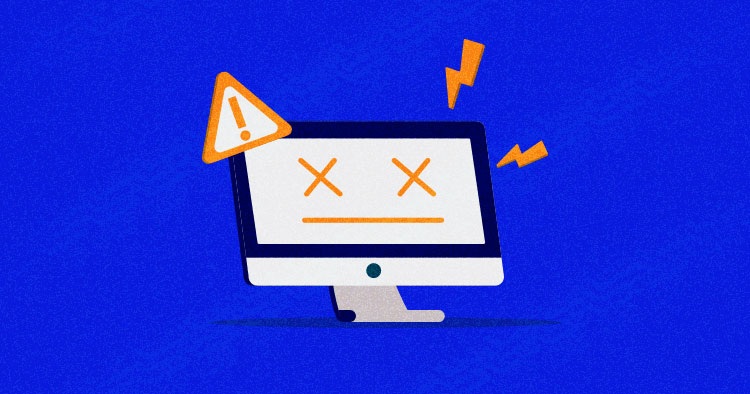
As we covered in our piece on reselling hosting to your clients, agencies no longer have to solely depend on the merits of their client acquisition team to make ends meet. Instead, they have the opportunity to create several revenue streams to generate recurring income, and better cater to their existing clients at the same time. One way to do this is by reselling hosting to your clients.
While it’s a relatively easy way to make some additional income, it’s not all smooth sailing. As a hosting reseller, you’re essentially acting as a middleman between hosting providers and your end clients. That means any server-level issues that affect your clients’ websites are now your problem. And if those websites crash due to high traffic or any other reason, it’s up to you to resolve the problem. Your efforts during these times are crucial, and when you deliver excellent results, you are able to ask your clients for a referral as well. This means this is a perfect opportunity for you to acquire new clients as well.
Why a UK Based Digital Agency Trust Cloudways for their Client Web Hosting
What is a Website Crash?
Websites crashing is an indicator of something going wrong, like issues with the code, plugin errors, expired domains, hacking attempts, and other issues we’ll cover below. A crashed website has essentially stopped serving data.
This means your blogs, images, videos, and other site resources cannot be accessed by visitors. The minute your client’s website is down, they’re missing out on opportunities to engage with and convert visitors.
So let’s get into the most common reasons websites crash, how you can prevent your clients’ websites from crashing, and how you can help them recover after a crash.

Why do Websites Crash?
Websites usually crash when something goes wrong. For instance, incompatible plugins, expired domains, or code issues may cause websites to crash. If your website crashes, you need to quickly get it back up and running, as you’ll lose valuable traffic.
1. Errors in Web Code
If your client has broken their web code during routine website maintenance or updates, it might result in a website crash.
It’s essential that everything is thoroughly checked and run through Quality Assurance teams before it’s taken live. A good practice is to check everything in the staging environment before taking the changes live.
Also, discourage your clients from playing around with the code and backend stuff unless they are sure of what they are doing.
Add maintenance services as part of your portfolio, your customers will thank you for that and will be willing to pay for you, an expert to take care of changes in their code.
At the same, you can use tools to automate a big chunk of the maintenance work, so you can keep your profit margins high and manually intervene only when there is an issue. Read more about selling maintenance services here .
2. Malicious Attacks and Hacking Attempts
The online landscape can be hostile. There are countless bots and hackers with malicious intent attempting to break into your clients’ websites, which could result in site crashes.
These hackers or bots try to get into the backend and meddle around with the code, attempt for security breaches or harm the overall integrity of the website.
Common examples of these malicious attacks include Dos and DDoS attacks. That’s where your website is flooded with a fake traffic surge from malicious bots denying entry to your legitimate users.
Here’s a detailed guide on what DDoS attacks are and how to prevent them
3. Plugin Issues
Your client might accidentally delete a plugin from their website – one that’s necessary for their site’s functionality.
Or the website might be facing plugin errors if a particular plugin conflicts with the rest of the website.
If your client has installed a new plugin without looking into its developers, or updated a plugin, that could be a potential cause for the website going down. It may be possible that a plugin needs to be updated, and that’s why it brought down the site.
4. Expired Domain and DNS Errors
An expired domain name is a common reason for website crashes, but this is quite an easy problem to fix.
The domain name is part of your client’s brand and helps visitors find their website. It needs regular maintenance to function properly – ensure the payment method and contact information is updated on a routine basis.
Better yet, turn on the auto-renew option to keep the domain from expiring.
The DNS provider might also suffer attacks from malicious parties that might render your clients’ websites inaccessible to users. In that case, contact the provider to resolve the issue.
5. Hosting Provider Error
If your client’s website has experienced an influx of traffic that the server doesn’t have space for, it could lead to a crash.
This can also happen when the server’s physical location is too distant from the website’s end users.
Additionally, when your clients’ hosting plan isn’t large enough to sustain a growing number of visitors, their websites will start to slow down or crash. This issue is common with low-budget hosting plans and shared hosting solutions.
Getting cloud hosting for your or the client’s website takes care of this issue a great deal.
6. Traffic Surges
This point is in correlation with the website hosting.
Websites have a certain capacity to allow a certain number of visitors at one time. When the site receives visitors that it’s not prepared to handle, it crashes!
In technical terms, the bandwidth and the ram of the website are inadequate to deal with sudden online traffic hikes.
This is usually the reason why online stores crash during holiday seasons or when they launch a too-good-to-be-true sale.
A good practice is to revisit your hosting package at times when you anticipate heavy traffic. This can keep you safe from swelled traffic numbers for the most part. It is best to choose a hosting service with high traffic and highly available hosting servers, like Cloudways.
How to Keep Your Clients’ Websites From Crashing
As you can see, a crashed site might result from either website-level or server-level issues.
In your capacity as an agency, it is your responsibility to ensure all the technical aspects are addressed before handing off the site to your client.
Here, you’ll analyze any code error, especially if the site has undergone any sort of updates in your care. Have your developers resolve any potential plugin problems as well.
When it comes to server-level issues, your clients will expect you to handle these as well if you’re reselling hosting. Whatever, the case, we’ve got you covered.
Resell Cloudways Web Hosting & Earn $$$.
With Cloudways, you can sell top-notch managed hosting to your clients at a price of your choice.
Here’s a list to check off in order to prevent website crashes for your clients.
1. Preventing Website Level Crashes
- Keep the client’s site up-to-date and secure: Any maintenance packages you offer clients after handing them over their websites will entail routine updates.
Outdated websites will often not cope under the pressure of sudden traffic spikes.
Make sure to make any software update at appropriate times – never during big holidays or during high traffic surges. Choose to schedule or automate updates when they’re available. - Vet the plugins you use: Carefully research the developers that produce the plugins you want to use on your or the clients’ website.
Look into any possible conflicts with other plugins existing on the website, and with site features. It’s a good practice to use plugins developed by renowned developers and companies.
They are also quick to resolve issues and send regular updates to better the plugin. - Monitor site performance: Keep an eye on the software that is powering your clients’ websites.
Older versions are susceptible to bugs and security issues, both of which can lead to website crashes.
Regularly check how the site performs under high traffic using the right testing tools. This will also let you advise your clients on increasing their server’s capacity. - Advise your clients to back up their sites: In spite of all your best precautions, web crashes are simply part and parcel of operating on the internet.
Regular backups are the only way to mitigate this damage so your clients can recover lost content.
If you resell hosting to your clients, ensure you’re working with a high-quality hosting service to minimize the chances of crashes. Cloudways, for instance, offers an automated backup plan for all its hosting options.
Avoid reselling incompetent hosting services as their servers experience regular crashes, and you’d dread dealing with complaints from your clients.
2. Preventing Server Level Crashes
Ensure the web host you choose is exemplary: When it comes to avoiding server-level issues, this is the greatest priority.
Pick the right host and hosting plan for your client after consulting with them on their needs. A business website that expects frequent high traffic surges, for instance, can’t use shared hosting – after all, they need high RAM and bandwidth and fast processing and storage.
As a hosting reseller, it would be quite ill-advised to go with shared hosting, with its tendency to crash under stress.
Keep your clients on a dedicated hosting plan; make it a managed plan with smart features that let you easily handle different client accounts. For example, Cloudways:
- Allows you to handle multiple projects for different clients
- Lets your clients scale their business without worrying about downtime or their websites crashing
- Comes with excellent support that you can turn to at any time of the day in case of mishaps
- Lets your clients migrate one website for free on the platform
One hosting feature you should be on the lookout for is a CDN.
A Content Distribution Network refers to a server network that distributes the load of content to several servers instead of a central server, which prevents website crashes. So even if a single server goes down, the other servers would make up the difference so end users would not experience a website crash.
One of the most popular CDN for WordPress is Cloudflare because of its huge global server network. A CDN like Cloudflare not only prevents crashes but also optimizes online content and speeds up loading times.
The good news for Cloudways users is that they get Cloudflare Enterprise level CDN from within the Cloudways platform at a small fraction of their original price.
Confused about picking the right hosting provider? Try our Web Hosting Pricing Calculator. It finds your ideal server size based on traffic and compares Cloudways to top competitors.
How to Recover After a Website Crash
As I mentioned earlier, website crashes are part of the game despite all your precautions.
If your clients’ websites go down, ensure you have a plan of action to facilitate quick recovery. Here are some of the steps you should take:
1. Check if the site really is down
Non-technical clients may not necessarily identify website crashes accurately.
Visit your client’s site and see if the website is displaying all right – if it does, the issue is with your client’s computer or poor internet connection.
Perhaps your client’s browser cache is showing an error page and simply needs to be refreshed.
2. Verify what kind of crash it is
If you’re offering a website maintenance package, it’s up to your team to diagnose and resolve the crash, even if it’s a website-level problem.
This could be a code issue due to a new plugin or higher-than-usual traffic overwhelming the point of payment.
You should have monitoring already set up to identify the problem.
3. Damage Control
Don’t leave the visitors with a crashed site that’s giving them a bad experience and pushing them away.
There are certain measures you can take to mitigate the damage.
- Firstly, set up a landing page on your domain which says that the website is under maintenance. This is what your visitor should see instead of error messages. It’d be best if you can give them an estimated time within which the site will be restored.
- Stop your campaigns that bring you visitors from different traffic sources. There’s no point in attracting new visitors to a nonfunctional site.
- If you are running an ecommerce site, you can announce a discount voucher for those who come back once the site gets restored.
- Inform your visitors via social media channels that the website is down.
There are several ways to control the damage done to your site when it crashes. But taking these measures is crucial and may help you retain your visitors for the future.
4. Analyze and Evaluate
Agencies, freelancers, and even solo techpreneurs are always experiencing new challenges with site maintenance.
Website crashes can be a good opportunity to learn why they happen and what can be done to prevent them in the future. Here are some tips to help you make the most of website crashes:
- Document the problems and the solutions that you find. This can save you from future troubles of starting from scratch if the need ever arises.
- Analyze the site again and hunt for any anomalies in the code, plugins, and the website’s overall backend structure that can cause future crashes.
These are the steps you take once the issue gets resolved.
5. Contact your hosting provider
First, check to see if your client has paid for hosting. Then contact support for the hosting provider you use and have them work with you to fix the issue quickly.
If you’re managing most or all aspects of your clients’ hosting, this responsibility falls on you; the client will not be making any calls to the provider themselves.
How Agency Owners Handle Website Crashes with Their Clients
We reached out to agency owners handling their clients’ websites to see how they deal with crashes. Here are the top tips they had for you.
1) Prevention works better than cure

According to Aaron Agius, CEO & Co-Founder of Louder.Online:
“As a global digital marketing agency, we often offer to handle our clients’ hosting needs. Website hosting and crash mitigation is not my area of expertise, which is why I prefer to focus on prevention above all. We ensure daily backups, CDN services, regular software updates, and maintenance.
Our clients’ websites sometimes crash due to traffic surges from marketing campaigns. Having a piece of your content go viral feels great, but I can’t say the same for the website. We’ve gotten a lot better at managing such crashes in the past few years — we focus on optimizing the site performance, run load tests, and have backup plans in case of traffic surges. If the site does go down, we start it back up with limited features until it stabilizes. ”
2) Have a plan for traffic spikes and DNS failures

Here’s what Oliver Andrews, owner at OA Design Services, has to say
“Website traffic spikes- Optimize the performance of your website so you don’t experience website crashes due to a spike in traffic. You can do this by using a content distribution network (CDN) or upgrading your hosting plan to include more resources.
Domain Name System (DNS) provider failure – Set your domain to auto-renew to avoid downtime due to an expired domain. You can also set a reminder on your phone or calendar a few weeks before the expiration date.
Code Errors- When making code changes, make sure the code is correct and there are no typos. Invest in an experienced developer to avoid this.”
3) Map for an Uptick in Traffic

For Shiv Gupta, CEO of Incrementors SEO Services, it’s all about planning around traffic:
“Every website owner fantasizes about a traffic spike. It’s natural: more traffic equals more sales. However, if your website is unaware of sustaining growth in web traffic, you can lose more than you can gain. Traffic waves can cause websites to slow down and ultimately crash. If you require a sale that could destroy your servers and cause a website disaster, buy some extra capacity. Also make sure you have a quantity of supply on hand.”
4) Protect against malicious attacks and website errors

Assured Marketing’s co-founder and director Jack Story has a well-rounded take on crashes due to malicious attacks:
“As a digital marketing agency specializing in website optimization, we have a large number of clients who come to us for not only their website design but its hosting and maintenance too.
Firstly the most important thing for us is having regular back ups, we take hard copies of all of our clients websites from our hosting provider every week and ensure to keep a minimum of 2 weeks worth of back ups. This allows us to easily recover a website if it is ever lost or if we discover that something within the website has broken.
When reselling hosting we find that the most common cause for websites to go down, especially if the site is hosted on a shared hosting plan is a malicious attack on other sites operating the same space such as DDoS attacks. Firstly we conduct regular server and website requests which alerts us of any down time and for how long for, this ensures that on the rare occasion that there has been some kind of attack we can react as quickly as possible.
Following this we then alert the hosting provider if they are not already aware of the issue and work closely with them to decide whether or not the situation is manageable or if the site needs to be moved onto the different server.
We have found that the above mentioned causes (malicious attacks and website errors) are the most common causes for website crashes.
We have found that the best way to avoid any downtime due to these issues is ensuring that the hosting provider that you are reselling from provides you with your own server allowing you to avoid downtime caused by other peoples websites, the second thing we do to avoid downtime is by regularly monitoring plugins and saving backups of the website in case of an error.”
5) Prioritize Debugging

John Locke, SEO Consultant at Lockedown Design & SEO says:
“For our hosting clients, we prioritize debugging for unexpected website crashes. This means, if their site goes down, we are on the case to figure out what happened, and fix the issue immediately.
The most common reasons for a crash are code conflicts, or as happened recently with AWS, an issue at the host. Usually, with a code conflict caused by a client adding a plugin or an automatic update, we can pinpoint the cause and either revert the site or plugin to a previous version, and then make sure all conflicts are eliminated before pushing updated code to production. Or, we call support at the host so our clients don’t have to to make sure the issues are resolved.
The best way to avoid unexpected crashes is to use a reputable host, and reduce the number of potential code conflicts in the website. Using a stable hosting company with resources and support helps eliminate a lot of crashes. Building a site with well coded, rigorously tested themes and plugins will also minimize the risk of code conflicts and fatal errors.”
6) Choose a quality hosting provider that specializes in uptime

Robert Soares, founder of Provided.io, has this to say:
“This is very interesting to me as a career Chief Technology Officer and founder of a development firm who now builds SaaS services and sites for companies.
There are a few aspects to preventing website crashes. Perhaps the most important is to select a high quality vendor for your hosting, whether you’re reseller hosting for your own clients, or hosting a site directly as a business. The age-old profession of systems administration, where I personally got my start, is still alive and well. Systems administration has now been abstracted from the average engineer, CIO, CEO, or product department. These experts in uptime now live in managed service providers like Cloudways or Managed AWS Hosting.
The other powerful approach is to ensure quality code of the site itself. This includes aspects like unit testing, an effective QA process, and making sure to provide enough time and bandwidth towards reducing technical debt. Technical debt is the term for when engineers have implemented a quick solution, rather than a robust solution, or where you know there is a library, framework, or approach that has been deprecated or replaced.
Technical debt is often ignored in companies because it is not directly revenue producing. That does not mean that it can be ignored forever. Much like financial debt, a little bit can be helpful in making sure that you are delivering results at the time those results are required. Too much debt however, can overwhelm the system and result in an unstable website or application, which will result in crashes no matter how reliable your hosting provider.
Fundamentally, these considerations are why I started my own development firm, Provided.io. We strive to produce efficient code, with effective unit and functional testing practices. We also provide companies with awareness of technical debt and how it can grow, as well as when we create technical debt in service of delivering business requirements faster for them.
I have found that this approach results in faster development, as well as increased reliability. We then, of course, pair this approach with effective partnership with excellent organizations that provide hosting, like Cloudways. It is inefficient in this day and age for an organization to hire its own systems administrators in most cases; better to leave it to the experts.”
To Conclude
As a website maintenance provider, it will often fall on you to resolve any server-related issues that lead to a website crash for your client.
If site uptime is your responsibility, have a plan in place to deal with any potential crashes. Mitigate potential damage through updates and backups, and use a top service provider that’s well-equipped to handle your clients’ hosting.
Cloudways also let’s you resell its hosting services. Agencies can use this opportunity to create another dependable revenue stream to generate recurring income.
Q1. What should you do if a client’s website keeps crashing?
Frequent or repetitive website crashes are usually down to server overload or malicious cyber attacks.
If you’ve resolved all potential hardware and software issues but the website is still crashing, there’s a good chance it’s one of those two problems.
Use the ways outlined in this article to deal with the issue. Recurring crashes may also be a result of a bad hosting provider. Choosing reliable hosting services can resolve the issues for you.
Q2. Can too much traffic crash a website?
Unplanned-for traffic spikes are quite a common reason for website crashes.
A sudden surge of traffic can easily crash a website whose processors and network speeds aren’t prepared for it.
Make sure to prepare your clients for high-traffic days like Black Friday and Cyber Monday, and for any influx following a marketing campaign.
Raza Aslam Lakhani
I'm a digital content producer at Cloudways. I'm also a hodophile- always ready to explore new places and cultures. Other than that, I play guitar and love to indulge myself in deep, meaningful conversations. Always looking for opportunities to learn new things.


